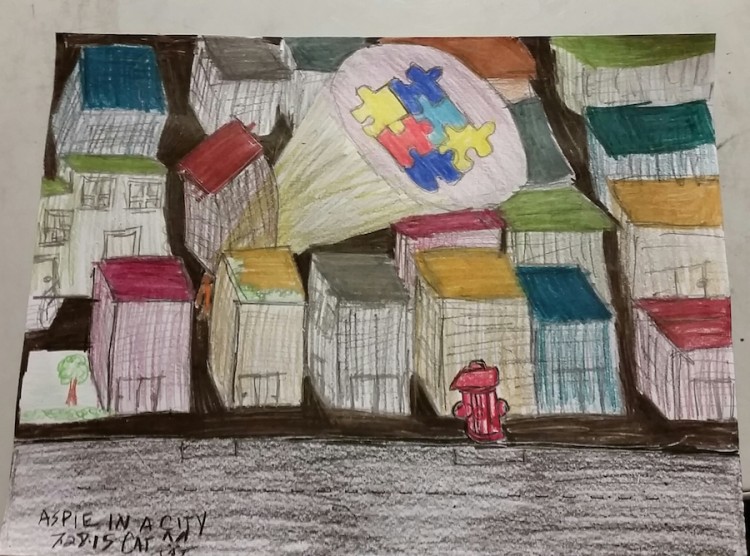Hi there! I’m Catherine, and I’m a proud Aspie. It makes me who I am.
There are a lot of misconceptions about being on the autism spectrum. Today, I want to tell you about some things I wish people understood about us Aspies. I wrote a bunch of examples on a piece of paper and decided to share my top five decisions with you. Remember — everyone on the spectrum is different.
These are five things I personally wish people understood about having Asperger’s syndrome.
1. Sometimes we, too, can be nonverbal
I say this because “verbal” is often in people’s descriptions of Asperger’s syndrome. But we, too, are on the spectrum, and when we shut down or have a meltdown we can be nonverbal. We may even come off as “lower functioning” during this time, and that’s OK. We all react to an overwhelming sensory overload in our own way. Those who loves us most know what we need or don’t need in that moment. Please understand even though we are “higher-functioning” we also have moments where we’re not. That’s OK.
2. Don’t listen to the media.
The media doesn’t always speak the truth. Journalists are most likely not professional doctors, and they’re often not even speaking to doctors who know about the autism spectrum. Just because someone is a “loner” doesn’t mean they have Asperger’s syndrome. Asperger’s syndrome isn’t something that makes someone kill somebody else. We will not shoot up a school. Please understand we are empathetic. We experience feelings too. We just have trouble expressing them. Sometimes, we feel the others’ emotions to an extreme. We can sense what you’re feeling before you tell us.
3. There’s more to it than what you see.
Yes, we have may trouble socially, but other challenges can exist. Some of us may have a learning disability. For example, I have Central Auditory Processing Disorder, which means I can’t process what I hear the way others do. Sometimes I need to tell people to write on a piece of paper or look at me when they talk. People with Asperger’s may also have digestive problems, ADD/ADHD and/or sensory issues. We may have hypo- or hyper-sensitive hearing, touch, sight, smell or taste. There’s more to a diagnosis than what’s commonly acknowledged, so please understand these other common challenges.
4. Socializing isn’t easy.
I’ve learned that not everyone is going to talk to me. I have to make the first step too. In my first semester of college I told myself I wanted to make a friend. I only had one class this semester because my anxiety was so high. This was five years after I’d graduated high school. I sat next to a girl in the computer lab and decided even though I’m not a purse girl that I would compliment her purse in the hopes that she would say something back. Maybe we could talk. I practiced this for weeks until one day I just decided to do it. My voice was shaking, but she said thanks and I responded with a question about the class assignment. We kept talking and ended up in the next three classes together. After three years, we’re still good friends. Yes, we want to have friends too; it’s just hard for us to make the first, or even the second, step. Sometimes we wish people were a little bit more understanding and realized we don’t always want to be alone.
5. Stimming isn’t only for the kids.
I’m 26 years old, and since I was 7 have been doing the same thing when I get overwhelmed with hyperactivity, when there’s a thunderstorm, when I get anxious, when the sensory overload begins. That’s OK. Now that I’m older, I sometimes can acknowledge a situation and be able to handle myself, which means I stim to avoid a meltdown or shut down. Remember, Aspie kids grow up to become Aspie adults; we don’t grow out of Asperger’s syndrome. Some of us may be able to be more subtle about our stimming and some of us sometimes cannot. Please understand, stimming helps us, and it’s OK to do if it doesn’t hurt us.
If I could add a number six it would be that most of us who understand, love and are proud of our diagnosis don’t see it as a disability. We wouldn’t ask for a cure. I’m one of those Aspies who would never ask for a cure. I am who I am, and I’m on the autism spectrum. I’m an Aspie. I’m unique, and I may have certain challenges in my life, but I wouldn’t change it. I’m proud of myself, and I love who I’ve become. A cure isn’t needed because I’m not sick.
Of course, every life experience is different for each individual. I just wish others would take the time to understand the people they know on the spectrum.

